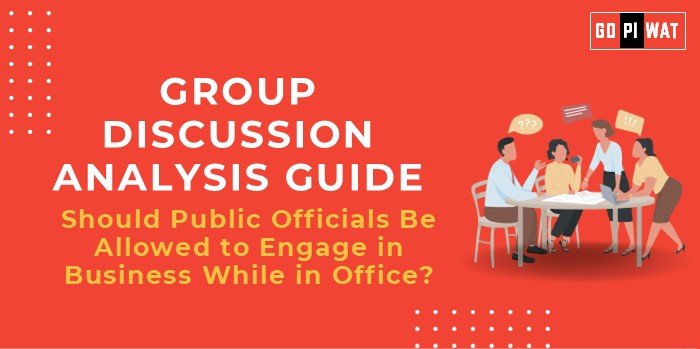📋 Group Discussion (GD) Analysis Guide
🤔 Should Public Officials Be Allowed to Engage in Business While in Office?
🌟 Introduction to the Topic
Opening Context: Public officials hold positions of trust and responsibility. Allowing them to engage in business activities while in office sparks debates on conflicts of interest, governance ethics, and transparency. Countries worldwide address this issue differently, reflecting their legal, cultural, and political contexts.
Topic Background: The debate on public officials engaging in business arises from the need to balance individual economic freedom and public accountability. International cases such as the U.S. Emoluments Clause highlight stringent safeguards, while other nations like India face ongoing challenges in governance ethics enforcement.
📊 Quick Facts and Key Statistics
- Corruption Perception Index (2023): India ranked 85th among 180 nations, indicating concerns about governance ethics.
- Conflict of Interest Reports: Nearly 40% of ethics violations in public offices globally stem from business interests (OECD, 2023).
- Comparative Case: The U.S. restricts officials from profiting from foreign government ties while in office.
🏛️ Stakeholders and Their Roles
- Public Officials: Maintain ethical standards and avoid conflicts of interest.
- Government Bodies: Enforce laws to prevent corruption and uphold transparency.
- Business Entities: Ensure non-collusion with officials to avoid undue influence.
- Civil Society: Advocate for greater transparency and monitor potential conflicts.
📈 Achievements and Challenges
- Achievements:
- Anti-Corruption Laws: Countries with strict regulations show lower instances of abuse.
- Public Trust: Ethical policies improve citizen confidence in governance.
- Technology Integration: Digital platforms help track conflicts of interest.
- Challenges:
- Regulatory Loopholes: Limited monitoring of indirect business links.
- Political Pushback: Resistance to stricter laws from vested interests.
- Global Comparisons: Nations like Estonia enforce zero-tolerance policies effectively, but others struggle with implementation.
🗣️ Structured Arguments for Discussion
- Supporting Stance: “Allowing business engagements fosters innovation among public officials, provided strict transparency measures are in place.”
- Opposing Stance: “Engaging in business while in office erodes public trust and leads to governance failures through conflicts of interest.”
- Balanced Perspective: “A conditional framework allowing certain business activities, monitored closely by independent agencies, could strike a balance.”
💡 Effective Discussion Approaches
- Opening Techniques:
- “Public officials are trustees of public resources; engaging in private businesses raises questions of priority and ethics.”
- “Global examples show varying success in balancing ethical governance and economic freedoms for officials.”
- Counter-Argument Handling:
- Use examples like Singapore’s meritocratic governance structure.
- Provide data-driven rebuttals about conflict of interest cases worldwide.
🔍 SWOT Analysis
- Strengths: Potential economic benefits, encourages entrepreneurial government policies.
- Weaknesses: Risk of favoritism, divided attention between governance and personal gain.
- Opportunities: Frameworks for ethical oversight, global leadership in transparency practices.
- Threats: Public backlash, international criticism for lack of transparency.
📚 Connecting with B-School Applications
- Real-World Applications: Relevant for courses on business ethics and corporate governance, and potential topics for policy analysis projects.
- Sample Questions:
- “What frameworks would you suggest to manage conflicts of interest in public offices?”
- “Discuss an international case that demonstrates effective management of such issues.”
- Insights: Understanding ethics in decision-making, balancing personal ambition with public responsibilities.


